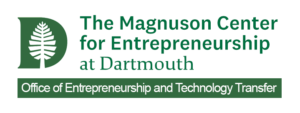West End Furthers Spirit of Collaboration, Innovation
The West End, slated to open during winter term, will provide a physical space that embodies the ethos of collaboration and innovation at Dartmouth.

If you walked into the Magnuson Center this week, you would see packing boxes lining the hall. The faculty is preparing to move from the current space to the new West End hub, home to the Center for Engineering and Computer Science (CECS).
The building will be home to the Magnuson Center, Thayer School of Engineering and the Department of Computer Science. It will house the DALI Lab, a maker space, a machine learning lab, robotics and biotech labs and much more. The entire building is designed to bring together Dartmouth undergraduates, graduate students and faculty to work on the world’s most significant challenges.
“The West End vision is so much more than brick and mortar,” Dartmouth President Phillip Hanlon ’77 said during a Magnuson Center panel this week. “What’s happening on the West End is a galvanizing of all the brain power on campus, against some of the most pressing issues facing human kind.”
The Future of Liberal Arts Education
Dartmouth has long been known for its collaborative spirit. More and more, that signifies the future of liberal arts education, said Dartmouth Board Chair Liz Lempres ’83 Th ’84. Students and their parents want an education where technology and problem-solving skills are integrated through every aspect of learning. That’s exactly what the West End offers.
“Students will graduate with a real ability to understand where the world is going, rather than where the world was,” Lempres said.
About 75% of Dartmouth graduates take a computer science or engineering course, so most undergraduates will come through the West End. Even for those who are studying the humanities, that represents a powerful opportunity, said Chair of Thayer Board of Advisors Sam Truex ’92, Th ’93, Tu ’95.
“We’re expanding so that we have more faculty and more room for interdisciplinary interactions to come up with new ideas and pursue them,” Truex said.
The work done at the West End will be cutting-edge, but rooted in Dartmouth’s liberal arts education.
“There needs to be more human touch,” said Dartmouth Trustee Jeff Blackburn ’91,
That’s important for all students.
“We should not assume that the West End is just for engineers and entrepreneurs,” Lempres said. The entire Dartmouth community can learn from the approach to innovation that the West End will foster. That will benefit not only Dartmouth, but the entire global community.
“We’re bringing together the institution so that the whole is greater than the sum of the parts,” Lempres said.
A Boon for Innovation
When Amogha Tadimety Th PhD ’20, co-founder and CEO of Nanopath, was launching her company, she found herself running all over campus. She learned about entrepreneurship at the Magnuson Center, visited labs at Thayer and utilized design spaces on campus. Having all those resources in one space would have been a huge resource for Tadimety and her co-founder, she said during the panel discussion.
Beyond the convenience of having resources for innovation under one roof, Tadimety said that the West End will show prospective entrepreneurs that bringing new technology to market is possible.
“It’s more than just the proximity, it’s the inspiration,” she said. “Seeing other people taking their ideas out of the lab and translating them is going to be incredible for the PhD students and undergrads.”
Magnuson Center Board Member and Y combinator President Geoff Ralston ’82, put it simply: “This is the way that the company founders of the future are going to meet their cofounders,” he said.
All great innovation emerges from the intersection of different technologies, he added, and that intersection will happen at the West End.
Centering Entrepreneurship on Campus
Right now, the Magnuson Center for Entrepreneurship isn’t centrally located, but soon the center will be at the heart of campus, said Director Jamie Coughlin.
“Our move is going to be rocket fuel for our entrepreneurship program across campus,” he said.
A central challenge of entrepreneurship is physically building a new technology.
“One of the strongest aspects of a successful and robust entrepreneurial system is partners that can take these ideas and actually build products and services,” Coughlin said. The West End provides that by strengthening the existing connection between the Magnuson Center, the Department of Computer Science and Thayer. Having those components in closer proximity will enrich an already-flourishing community.
“There’s a culture of innovation and entrepreneurship that has already been started and is strong in the West End,” Coughlin said. “We’re looking forward to building on that.”

